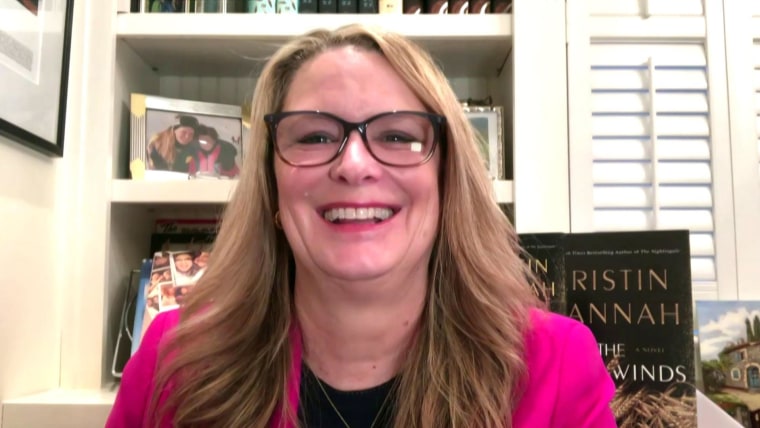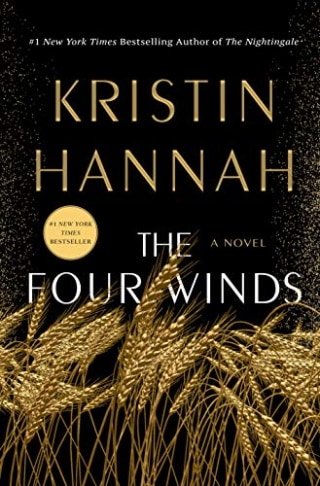For February's Read With Jenna book club pick, Jenna Bush Hager selected "The Four Winds," by Kristin Hannah.
Hannah's 24th book tells the story of Elsa Wolcott. Living in Texas in 1921, Elsa is deemed too old for marriage. With her reputation in ruin, she marries a man she considers to be her last hope, Rafe Martinelli.

More than 10 years later, the country is sliding into depression and the Great Plains that were previously bountiful have been destroyed by drought. Elsa uses her fierce inner strength to beat heartbreak, suffering and starvation to save her children’s lives.
Use the questions below to spark a conversation about the book with fellow readers and book club members.
“Hope is a coin I carry. . . . There were times in my journey when it felt as if that penny and the hope it represented were the only things that kept me going.”¹ What is the significance of the fact that it is an American penny? In what ways does hope anchor us in the moment, and in what ways does it push us forward? Do you or your family have any keepsakes that represent your family’s hope for the future?
The stories of women have largely gone undocumented throughout history, and this era is no different. It is changing slowly, and women’s courage and determination and victories are being brought to light. How are women’s stories different? Why do you think they’ve gone unreported for so long? Do you think sharing these stories will make a difference to future generations?
Life was very different for unmarried young women in earlier generations. Expectations for their future were sharply defined. How is Elsa shaped by these expectations and her failure to meet them? Do you think it would have been the same for her in New York City? Did you feel compressed by expectations when you were growing up? Do you think these societal mores were designed to keep women “in their place”? How difficult is it to defy both family and society in a small town?
“She wished she’d never read 'The Age of Innocence.' What good came from all this unexpressed longing? She would never fall in love, never have a child of her own.”⁸ Literature is like the opening of a door. Through that door, Elsa saw whole, other lives and other futures. What books influenced you when you were growing up? Did any novel and/or character change your perception of either yourself or the world? Did you identify with Elsa and her journey throughout this book? In what way?
“She had to believe there was grit in her, even if it had never been tested or revealed.”⁹ This sentence highlights Elsa’s essentially hopeful nature, even though she doesn’t believe in herself. Her family and her world have pared her down to inconsequence. Does this idea resonate with you? Have you seen it at work in other people? In yourself?
In 1920s America, there was significant prejudice against Italians; we see that prejudice in Elsa’s own family. What does Rafe represent to Elsa on the night they meet? Is it simply sex and loneliness? Or do you think there’s something deeper involved? Another small defiance against her parents’ small-mindedness? What does it say about Elsa that she went with Rafe so willingly?
“My land tells its story if you listen. The story of our family. We plant, we tend, we harvest. I make wine from grape cuttings that I brought here from Sicily, and the wine I make reminds me of my father. It binds us, one to another, as it has for generations. Now it will bind you to us.”⁵¹ How are people connected to the land that they occupy? What about the land they farm? Describe that unique and complicated connection.
Motherhood changes Elsa in almost every way. What does she learn by becoming a mother? What does she learn about motherhood from Rose? How does motherhood strengthen a woman? How does it weaken her? How does Elsa remain “herself” after giving birth? How does she change?
The adolescent years can be especially difficult for mothers and daughters. Did you dislike Loreda during these years? Did you understand her?
“Tony and Rose were the kind of people who expected life to be hard and had become tougher to survive. . . . They might have come off the boat as Anthony and Rosalba, but hard work and the land had turned them into Tony and Rose. Americans. They would die of thirst and hunger before they’d give that up.”⁷⁶ Do you think this attitude is a common thread in those who across generations have come to chase the American Dream? Why is land so important to that dream? How does one “become American”?
What bonds Loreda and her father? What dreams do they share? Do they intend to exclude Elsa, whom they perceive as just a workhorse? Or is she partially to blame for being ostracized? How does her lack of self-esteem color her relationships with her husband and eldest child?
What do you think about Rafe? Was he as trapped by his family’s expectations as Elsa had been by her own? Did you expect him to leave?
How would you describe the Texas landscape the author paints? With its dust storms and earth, dry and zigzag-cracked, is it like any you’ve known?
Why does Rafe leave and what is he chasing out West? Do you have sympathy for how broken he felt by poverty and hardship? Should Elsa have agreed to go with him? How does Elsa aim to fill his void, and why does she believe she loves him even after the abandonment?
Why does the Martinelli family stay under such brutal conditions — the heat, the dust storms, the lack of food and the dying livestock? Does it reveal anything about the grit that literally fills their bodies? What choices do they have, and what might you have done during the drought? Were you surprised that Elsa set off without her in-laws? Would you have had the courage to do the same?
Life in California is not at all what the migrants expected and what advertisements had led them to believe. The locals treat them badly and are afraid of them. Why is that? How does the treatment of migrants in California during the Great Depression mirror the treatment of immigrants today? How is it the same? How is it different?
How do Elsa and her family remain unbroken even while enduring crippling poverty, food and shelter insecurity, and living in a town that is hostile to them? Would they have fared better in Texas?
What do Jack and the communist union organizers offer the migrant workers and Loreda in particular? Why is it a risk to associate with them and what is Elsa’s hesitation?
How does the Great Depression setting of "The Four Winds" compare to America during the coronavirus pandemic? What lessons of resilience and healing might be embedded in this story? How might others’ struggles inspire us? Do you have any family stories from the Depression?
They say that those who do not learn from history are doomed to repeat it. During the COVID-19 pandemic, Americans have faced many of the same challenges seen during the Great Depression. Did we learn from previous generations? What differences can you see in the two difficult times? What similarities? How do you think future generations will judge the America of today?
To stay up to date on the latest book club news, subscribe to the Read With Jenna newsletter!
For more book recommendations, check out:


